- Home
- J. M. Barrie
Sentimental Tommy Page 7
Sentimental Tommy Read online
Page 7
CHAPTER VII
COMIC OVERTURE TO A TRAGEDY
"Jean Myles bides in London" was the next remarkable news brought byTommy from Thrums Street. "And that ain't all, Magerful Tam is her man;and that ain't all, she has a laddie called Tommy and that ain't all,Petey and the rest has never seen her in London, but she writes lettersto Thrums folks and they writes to Petey and tells him what she said.That ain't all neither, they canna find out what street she bides in,but it's on the bonny side of London, and it's grand, and she wears silkclothes, and her Tommy has velvet trousers, and they have a servant ascalls him 'sir.' Oh, I would just like to kick him! They often looks forher in the grand streets, but they're angry at her getting on so well,and Martha Scrymgeour said it were enough to make good women like herstop going reg'lar to the kirk."
"Martha said that!" exclaimed his mother, highly pleased. "Heard youanything of a woman called Esther Auld? Her man does the orra work atthe Tappit Hen public in Thrums."
"He's head man at the Tappit Hen public now," answered Tommy; "and shewishes she could find out where Jean Myles bides, so as she could writeand tell her that she is grand too, and has six hair-bottomed chairs."
"She'll never get the satisfaction," said his mother triumphantly. "Tellme more about her."
"She has a laddie called Francie, and he has yellow curls, and shenearly greets because she canna tell Jean Myles that he goes to a schoolfor the children of gentlemen only. She is so mad when she gets a letterfrom Jean Myles that she takes to her bed."
"Yea, yea!" said Mrs. Sandys cheerily.
"But they think Jean Myles has been brought low at last," continuedTommy, "because she hasna wrote for a long time to Thrums, and EstherAuld said that if she knowed for certain as Jean Myles had been broughtlow, she would put a threepenny bit in the kirk plate."
"I'm glad you've telled me that, laddie," said Mrs. Sandys, and nextday, unknown to her children, she wrote another letter. She knew she rana risk of discovery, yet it was probable that Tommy would only hear herreferred to in Thrums Street by her maiden name, which he had neverheard from her, and as for her husband he had been Magerful Tam toeveryone. The risk was great, but the pleasure--
Unsuspicious Tommy soon had news of another letter from Jean Myles,which had sent Esther Auld to bed again.
"Instead of being brought low," he announced, "Jean Myles is granderthan ever. Her Tommy has a governess."
"That would be a doush of water in Esther's face?" his mother said,smiling.
"She wrote to Martha Scrymgeour," said Tommy, "that it ain't no pleasureto her now to boast as her laddie is at a school for gentlemen'schildren only. But what made her maddest was a bit in Jean Myles'sletter about chairs. Jean Myles has give all her hair-bottomed chairs toa poor woman and buyed a new kind, because hair-bottomed ones ain'tfashionable now. So Esther Auld can't not bear the sight of her chairsnow, though she were windy of them till the letter went to Thrums."
"Poor Esther!" said Mrs. Sandys gaily.
"Oh, and I forgot this, mother. Jean Myles's reason for not tellingwhere she bides in London is that she's so grand that she thinks if auldPetey and the rest knowed where the place was they would visit her andboast as they was her friends. Auld Petey stamped wi' rage when he heardthat, and Martha Scrymgeour said, 'Oh, the pridefu' limmer!'"
"Ay, Martha," muttered Mrs. Sandys, "you and Jean Myles is evens now."
But the passage that had made them all wince the most was one givingJean's reasons for making no calls in Thrums Street. "You can break itto Martha Scrymgeour's father and mither," the letter said, "and toPetey Whamond's sisters and the rest as has friends in London, that Ihave seen no Thrums faces here, the low part where they bide not beingfor the like of me to file my feet in. Forby that, I could not let myson mix with their bairns for fear they should teach him the vulgarThrums words and clarty his blue-velvet suit. I'm thinking you have todress your laddie in corduroy, Esther, but you see that would not do formine. So no more at present, and we all join in compliments, and mylittle velvets says he wishes I would send some of his toys to yourlittle corduroys. And so maybe I will, Esther, if you'll tell AaronLatta how rich and happy I am, and if you're feared to say it to hisface, tell it to the roaring farmer of Double Dykes, and he'll pass iton."
"Did you ever hear of such a woman?" Tommy said indignantly, when he hadrepeated as much of this insult to Thrums as he could remember.
But it was information his mother wanted.
"What said they to that bit?" she asked.
At first, it appears, they limited their comments to "Losh, losh,""keeps a'," "it cows," "my eertie," "ay, ay," "sal, tal," "dagont" (themeaning of which is obvious). But by and by they recovered their breath,and then Baker Lamsden said, wonderingly:
"Wha that was at her marriage could have thought it would turn out soweel? It was an eerie marriage that, Petey!"
"Ay, man, you may say so," old Petey answered. "I was there; I was oneo' them as went in ahint Aaron Latta, and I'm no' likely to forget it."
"I wasna there," said the baker, "but I was standing at the door, and Isaw the hearse drive up."
"What did they mean, mother?" Tommy asked, but she shuddered andreplied, evasively, "Did Martha Scrymgeour say anything?"
"She said such a lot," he had to confess, "that I dinna mind none on it.But I mind what her father in Thrums wrote to her; he wrote to her thatif she saw a carriage go by, she was to keep her eyes on the ground, forlikely as not Jean Myles would be in it, and she thought as they was alldirt beneath her feet. But Kirsty Ross--who is she?"
"She's Martha's mother. What about her?"
"She wrote at the end of the letter that Martha was to hang on ahint thecarriage and find out where Jean Myles bides."
"Laddie, that was like Kirsty! Heard you what the roaring farmer o'Double Dykes said?"
No, Tommy had not heard him mentioned. And indeed the roaring farmer ofDouble Dykes had said nothing. He was already lying very quiet on thesouth side of the cemetery.
Tommy's mother's next question cost her a painful effort. "Did youhear," she asked, "whether they telled Aaron Latta about the letter?"
"Yes, they telled him," Tommy replied, "and he said a queer thing; hesaid, 'Jean Myles is dead, I was at her coffining.' That's what he ayesays when they tell him there's another letter. I wonder what he means,mother?"
"I wonder!" she echoed, faintly. The only pleasure left her was to raisethe envy of those who had hooted her from Thrums, but she paid a pricefor it. Many a stab she had got from the unwitting Tommy as he repeatedthe gossip of his new friends, and she only won their envy at the costof their increased ill-will. They thought she was lording it in London,and so they were merciless; had they known how poor she was and how ill,they would have forgotten everything save that she was a Thrummy likethemselves, and there were few but would have shared their all with her.But she did not believe this, and therefore you may pity her, for thehour was drawing near, and she knew it, when she must appeal to some onefor her children's sake, not for her own.
No, not for her own. When Tommy was wandering the pretty parts of Londonwith James Gloag and other boys from Thrums Street in search of JeanMyles, whom they were to know by her carriage and her silk dress and herson in blue velvet, his mother was in bed with bronchitis in thewretched room we know of, or creeping to the dancing school, coughingall the way.
Some of the fits of coughing were very near being her last, but shewrestled with her trouble, seeming at times to stifle it, and then forweeks she managed to go to her work, which was still hers, becauseShovel's old girl did it for her when the bronchitis would not bedefied. Shovel's old slattern gave this service unasked and withoutpayment; if she was thanked it was ungraciously, but she continued to doall she could when there was need; she smelled of gin, but she continuedto do all she could.
The wardrobe had been put upon its back on the floor, and so convertedinto a bed for Tommy and Elspeth, who were sometimes wakened in thenight by a loud noise, which alarmed the
m until they learned that it wasonly the man in the next room knocking angrily on the wall because theirmother's cough kept him from sleeping.
Tommy knew what death was now, and Elspeth knew its name, and both werevaguely aware that it was looking for their mother; but if she couldonly hold out till Hogmanay, Tommy said, they would fleg it out of thehouse. Hogmanay is the mighty winter festival of Thrums, and when itcame round these two were to give their mother a present that would makeher strong. It was not to be a porous plaster. Tommy knew now ofsomething better than that.
"And I knows too!" Elspeth gurgled, "and I has threepence a'ready, Ihas."
"Whisht!" said Tommy, in an agony of dread, "she hears you, and she'llguess. We ain't speaking of nothing to give to you at Hogmanay," he saidto his mother with great cunning. Then he winked at Elspeth and said,with his hand over his mouth, "I hinna twopence!" and Elspeth, about tocry in fright, "Have you spended it?" saw the joke and crowed instead,"Nor yet has I threepence!"
They smirked together, until Tommy saw a change come over Elspeth'sface, which made him run her outside the door.
"You was a-going to pray!" he said, severely.
"'Cos it was a lie, Tommy. I does have threepence."
"Well, you ain't a-going to get praying about it. She would hear yer."
"I would do it low, Tommy."
"She would see yer."
"Oh, Tommy, let me. God is angry with me."
Tommy looked down the stair, and no one was in sight. "I'll let yer prayhere," he whispered, "and you can say I have twopence. But be quick, anddo it standing."
Perhaps Mrs. Sandys had been thinking that when Hogmanay came herchildren might have no mother to bring presents to, for on their returnto the room her eyes followed them woefully, and a shudder ofapprehension shook her torn frame. Tommy gave Elspeth a look that meant"I'm sure there's something queer about her."
There was also something queer about himself, which at this time had thestrangest gallop. It began one day with a series of morning calls fromShovel, who suddenly popped his head over the top of the door (he wasstanding on the handle), roared "Roastbeef!" in the manner of a railwayporter announcing the name of a station, and then at once withdrew.
He returned presently to say that vain must be all attempts to wheedlehis secret from him, and yet again to ask irritably why Tommy was notcoming out to hear all about it. Then did Tommy desert Elspeth, and onthe stair Shovel showed him a yellow card with this printed on it:"S.R.J.C.--Supper Ticket;" and written beneath, in a lady's hand: "AdmitJoseph Salt." The letters, Shovel explained, meant Society for thesomethink of Juvenile Criminals, and the toffs what ran it got hold ofyou when you came out of quod. Then if you was willing to repent theywrote down your name and the place what you lived at in a book, and oneof them came to see yer and give yer a ticket for the blow-out night.This was blow-out night, and that were Shovel's ticket. He had bought itfrom Hump Salt for fourpence. What you get at the blow-out wasroast-beef, plum-duff, and an orange; but when Hump saw the fourpence hecould not wait.
A favor was asked of Tommy. Shovel had been told by Hump that it was thecustom of the toffs to sit beside you and question you about yourcrimes, and lacking the imagination that made Tommy such an ornament tothe house, the chances were that he would flounder in his answers andbe ejected. Hump had pointed this out to him after pocketing thefourpence. Would Tommy, therefore, make up things for him to say;reward, the orange.
This was a proud moment for Tommy, as Shovel's knowledge of crime wasmuch more extensive than his own, though they had both studied it in thepictures of a lively newspaper subscribed to by Shovel, senior. Hebecame patronizing at once and rejected the orange as insufficient.
Then suppose, after he got into the hall, Shovel dropped his ticket outat the window; Tommy could pick it up, and then it would admit him also.
Tommy liked this, but foresaw a danger: the ticket might be taken fromShovel at the door, just as they took them from you at that singingthing in the church he had attended with young Petey.
So help Shovel's davy, there was no fear of this. They were superiortoffs, what trusted to your honor.
Would Shovel swear to this?
He would.
But would he swear dagont?
He swore dagont; and then Tommy had him. As he was so sure of it, hecould not object to Tommy's being the one who dropped the ticket out atthe window?
Shovel did object for a time, but after a wrangle he gave up the ticket,intending to take it from Tommy when primed with the necessary tale. Sothey parted until evening, and Tommy returned to Elspeth, secretive butelated. For the rest of the day he was in thought, now waggling his headsmugly over some dark, unutterable design and again looking a littlescared. In growing alarm she watched his face, and at last she slippedupon her knees, but he had her up at once and said, reproachfully:
"It were me as teached yer to pray, and now yer prays for me! That'sfine treatment!"
Nevertheless, after his mother's return, just before he stole out tojoin Shovel, he took Elspeth aside and whispered to her, nervously:
"You can pray for me if you like, for, oh, Elspeth; I'm thinking as I'llneed it sore!" And sore he needed it before the night was out.

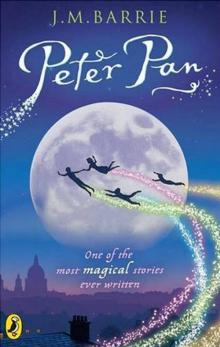 Peter Pan
Peter Pan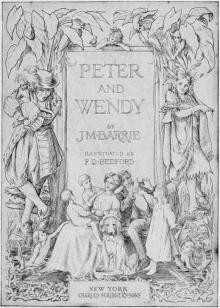 Peter and Wendy
Peter and Wendy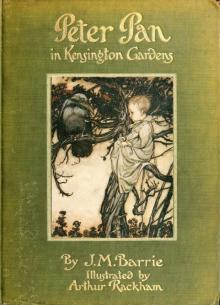 Peter Pan in Kensington Gardens
Peter Pan in Kensington Gardens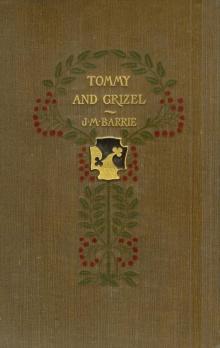 Tommy and Grizel
Tommy and Grizel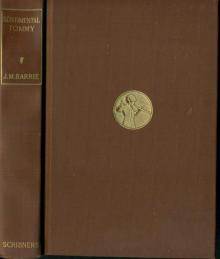 Sentimental Tommy
Sentimental Tommy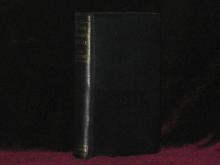 When a Man's Single: A Tale of Literary Life
When a Man's Single: A Tale of Literary Life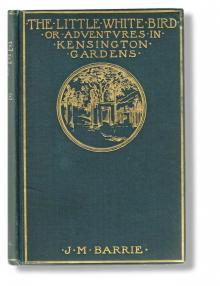 The Little White Bird; Or, Adventures in Kensington Gardens
The Little White Bird; Or, Adventures in Kensington Gardens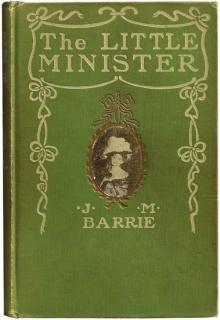 The Little Minister
The Little Minister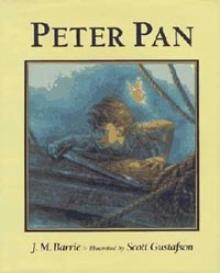 Peter Pan (peter pan)
Peter Pan (peter pan)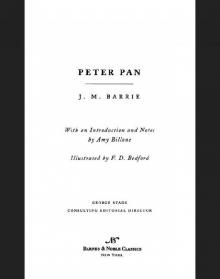 Peter Pan (Barnes & Noble Classics Series)
Peter Pan (Barnes & Noble Classics Series)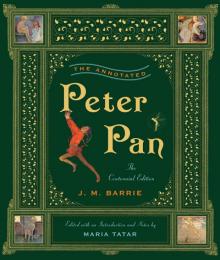 The Annotated Peter Pan (The Centennial Edition) (The Annotated Books)
The Annotated Peter Pan (The Centennial Edition) (The Annotated Books)